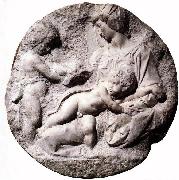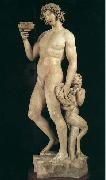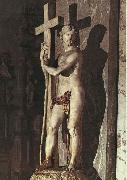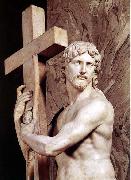Michelangelo Buonarrotib Caprese 1475 d Rome 1564 | |||
 |
|||
|
|
|
||||||||||
|
|
||||||||||
|
St Proculus Pintura Identificación:: 63025 Vea nuestra galería en Suecia |
St Proculus 1494 Marble, height: 58,5 cm with base San Domenico, Bologna In 1494 Michelangelo worked on the shrine of St Dominic, for which he carved this statue of St Proculus which echoes Masaccio and Donatello. (The companion statue of St Petronius testifies to Michelangelo's studies of Donatello and Jacopo della Quercia.) Artist: MICHELANGELO Buonarroti Painting Title: St Proculus , 1501-1550 Painting Style: Italian , sculpture Type: religious 1494_Marble,_height:_58,5_cm_with_base_San_Domenico,_Bologna_In_1494_Michelangelo_worked_on_the_shrine_of_St_Dominic,_for_which_he_carved_this_statue_of_St_Proculus_which_echoes_Masaccio_and_Donatello._(The_companion_statue_of_St_Petronius_testifies_to_Michelangelo's_studies_of_Donatello_and_Jacopo_della_Quercia.)__Artist:_MICHELANGELO_Buonarroti_Painting_Title:_St_Proculus_,__1501-1550_Painting_Style:_Italian_,_sculpture_Type:_religious |
|||||||||
|
|
||||||||||
|
Madonna and Child with the Infant Baptist Pintura Identificación:: 63026 Vea nuestra galería en Suecia |
Madonna and Child with the Infant Baptist 1505-06 Marble, diameter: 82,5 cm The Royal Academy of Arts, London This tondo explores the problems of composing a meaningful group within a circle, with a precise definition of the spatial planes and relationships within the picture space. The Doni Tondo, his only finished panel painting, and another marble relief, the Pitti Tondo deal with the same problems. Artist: MICHELANGELO Buonarroti Painting Title: Madonna and Child with the Infant Baptist (Taddei Tondo) , 1501-1550 Painting Style: Italian , sculpture Type: religious 1505-06_Marble,_diameter:_82,5_cm_The_Royal_Academy_of_Arts,_London_This_tondo_explores_the_problems_of_composing_a_meaningful_group_within_a_circle,_with_a_precise_definition_of_the_spatial_planes_and_relationships_within_the_picture_space._The_Doni_Tondo,_his_only_finished_panel_painting,_and_another_marble_relief,_the_Pitti_Tondo_deal_with_the_same_problems.__Artist:_MICHELANGELO_Buonarroti_Painting_Title:_Madonna_and_Child_with_the_Infant_Baptist_(Taddei_Tondo)_,__1501-1550_Painting_Style:_Italian_,_sculpture_Type:_religious |
|||||||||
|
|
||||||||||
|
Bacchus Pintura Identificación:: 63029 Vea nuestra galería en Suecia |
Bacchus 1497 Marble, height: 203 cm Museo Nazionale del Bargello, Florence At the age of 21 Michelangelo went to Rome for the first time. We still possess two of the works he created in this period (Bacchus and Piet?; others must have been lost for he spent five years there. The statue of Bacchus was commissioned by the banker Jacopo Galli for his garden and he wanted it fashioned after the models of the ancients. The body of this drunken and staggering god gives an impression of both youthfulness and of femininity. Vasari says that this strange blending of effects is the characteristic of the Greek god Dionysus. But in Michelangelo's experience, sensuality of such a divine nature has a drawback for man: in his left hand the god holds with indifference a lionsksin, the symbol of death, and a bunch of grapes, the symbol of life, from which a Faun is feeding. Thus we are brought to realize, in a sudden way, what significance this miracle of pure sensuality has for man: living only for a short while he will find himself in the position of the faun, caught in the grasp of death, the lionskin. The statue was transferred to Florence in 1572. Artist: MICHELANGELO Buonarroti Painting Title: Bacchus , 1501-1550 Painting Style: Italian , sculpture Type: mythological 1497_Marble,_height:_203_cm_Museo_Nazionale_del_Bargello,_Florence_At_the_age_of_21_Michelangelo_went_to_Rome_for_the_first_time._We_still_possess_two_of_the_works_he_created_in_this_period_(Bacchus_and_Piet?;_others_must_have_been_lost_for_he_spent_five_years_there._The_statue_of_Bacchus_was_commissioned_by_the_banker_Jacopo_Galli_for_his_garden_and_he_wanted_it_fashioned_after_the_models_of_the_ancients._The_body_of_this_drunken_and_staggering_god_gives_an_impression_of_both_youthfulness_and_of_femininity._Vasari_says_that_this_strange_blending_of_effects_is_the_characteristic_of_the_Greek_god_Dionysus._But_in_Michelangelo's_experience,_sensuality_of_such_a_divine_nature_has_a_drawback_for_man:_in_his_left_hand_the_god_holds_with_indifference_a_lionsksin,_the_symbol_of_death,_and_a_bunch_of_grapes,_the_symbol_of_life,_from_which_a_Faun_is_feeding._Thus_we_are_brought_to_realize,_in_a_sudden_way,_what_significance_this_miracle_of_pure_sensuality_has_for_man:_living_only_for_a_short_while_he_will_find_himself_in_the_position_of_the_faun,_caught_in_the_grasp_of_death,_the_lionskin._The_statue_was_transferred_to_Florence_in_1572.__Artist:_MICHELANGELO_Buonarroti_Painting_Title:_Bacchus_,__1501-1550_Painting_Style:_Italian_,_sculpture_Type:_mythological |
|||||||||
|
|
||||||||||
|
Christ Carrying the Cross Pintura Identificación:: 63030 Vea nuestra galería en Suecia |
Christ Carrying the Cross 1521 Marble, height 205 cm Santa Maria sopra Minerva, Rome In this work, as in the 1499 Piet? Michelangelo did not portray pain as redemption in the medieval way, but perfect beauty as the expression of its consequence. Artist: MICHELANGELO Buonarroti Painting Title: Christ Carrying the Cross , 1501-1550 Painting Style: Italian , sculpture Type: religious 1521_Marble,_height_205_cm_Santa_Maria_sopra_Minerva,_Rome_In_this_work,_as_in_the_1499_Piet?_Michelangelo_did_not_portray_pain_as_redemption_in_the_medieval_way,_but_perfect_beauty_as_the_expression_of_its_consequence.__Artist:_MICHELANGELO_Buonarroti_Painting_Title:_Christ_Carrying_the_Cross_,__1501-1550_Painting_Style:_Italian_,_sculpture_Type:_religious |
|||||||||
|
|
||||||||||
|
Christ Carrying the Cross Pintura Identificación:: 63031 Vea nuestra galería en Suecia |
Christ Carrying the Cross 1521 Marble Santa Maria sopra Minerva, Rome Artist: MICHELANGELO Buonarroti Painting Title: Christ Carrying the Cross (detail) , 1501-1550 Painting Style: Italian , sculpture Type: religious 1521_Marble_Santa_Maria_sopra_Minerva,_Rome__Artist:_MICHELANGELO_Buonarroti_Painting_Title:_Christ_Carrying_the_Cross_(detail)_,__1501-1550_Painting_Style:_Italian_,_sculpture_Type:_religious |
|||||||||
|
|
||||||||||
| Artista Previo Próximo Artista | ||||||||||
|
|
||||||||||
| Michelangelo Buonarroti | ||||||||||
| b Caprese 1475 d Rome 1564 | ||||||||||
|
|
||||||||||
IntoFineArt Co,.Ltd.













